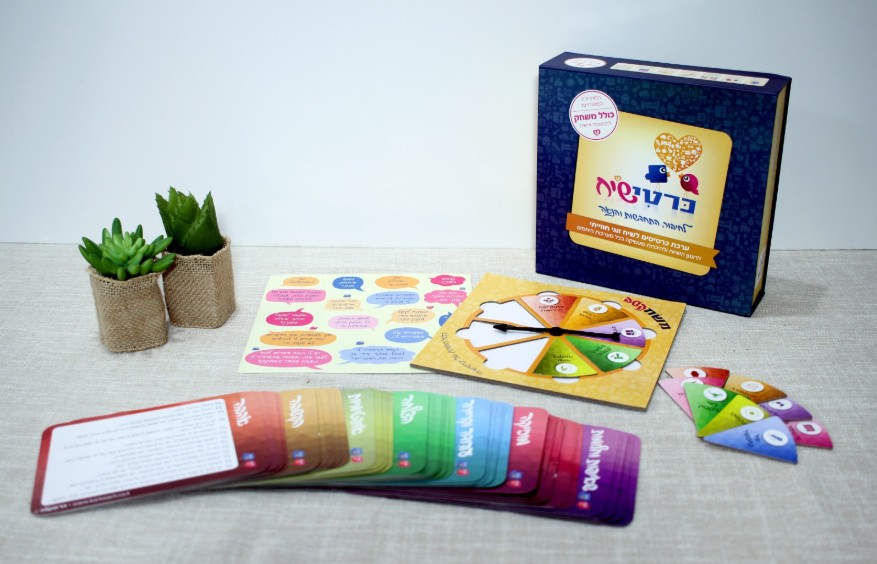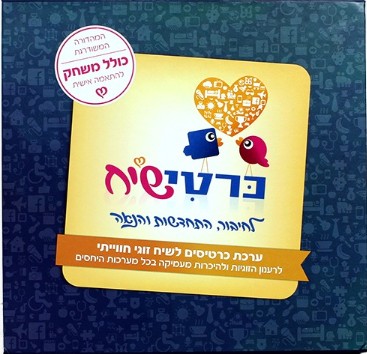"Suddenly We Realized: True, We Don't Have Children, But We Have a Happy Marriage, and That's a Lot"
For six years, Netanel and Racheli Weiss longed for children. During this time, they chose to strengthen their marital bond and express gratitude for what they had. Now as parents, they share insights through unique therapeutic cards.
 (Photo: Shutterstock)
(Photo: Shutterstock)When Netanel and Racheli Weiss married twelve years ago, they did not imagine the journey they would undergo to have their first child. It was a journey fraught with challenges, but it ultimately strengthened their marriage and inspired them to create unique therapeutic cards for the public.
"We were in a waiting position for six years," Racheli recalls. "Initially, we managed to be patient and encourage each other. We were very young—I was eighteen and Netanel was twenty-one—so we weren't worried. But after two years of waiting, on our second anniversary, I broke down for the first time. I remember a close friend called to wish me a happy anniversary, and I burst into tears, sharing my sadness over waiting two years for children with no progress. She was stunned and reminded me of my happy marriage and amazing husband, things not everyone has. She told me to rejoice in that and, with Hashem's help, the children would come."
When Racheli's friend spoke of the special marriage she had, she knew what she was talking about. "From the first week after the wedding, everyone knew that Wednesdays were off-limits," Racheli smiles. "Netanel and I dedicated Wednesday evenings solely for ourselves, having a 'weekly couple’s meeting,' which we never skipped."
In a conversation with Netanel, he adds there was another principle they adhered to since marriage. "A rabbi at my yeshiva advised me: 'Never go to sleep angry or with unresolved issues with your wife; make peace the same day.' I took this to heart," he notes. "After marriage, like any young couple, misunderstandings and tensions arose. Racheli and I made it a habit to discuss everything. Each time, we'd explore what triggered the issue, often realizing it was due to our different familial customs. These honest conversations helped resolve, and even preempt, many conflicts."
 (Photo: Natai Shanni)
(Photo: Natai Shanni)
"There Was Difficulty, Not Pressure"
Since the call with her friend about children, Racheli notes that both she and Netanel changed their perspective. "It wasn't easier for us; waiting was still hard, but we learned to appreciate the beauty of our marriage and enjoy our time together, knowing it wouldn't return. We decided to make the most of it."
They began pursuing treatments four years post-marriage. "Even then, there was no panic. It was more about investigating if something was preventing pregnancy," she explains. "After tests showed no specific issues, we began non-invasive treatments and prayed a lot, feeling this was a test of faith, and when Hashem decided, we’d have a child."
Were there no moments of difficulty?
"Of course there were," they answer together. "But there's a difference between difficulty and pressure," Netanel remarks. "Each month of disappointment was painful, but the pressure of 'why do others have and we don't?' didn't exist, thankfully. We truly believed in the goodness of our lives, not needing to compare ourselves to others, focusing on our strong relationship."
Racheli adds: "Social pressure wasn't something we felt. I easily joined friends at the park, helping with their kids, while praying for one of my own, without comparing myself to them. Yes, I wanted it, but their circumstances were unrelated."
After several more years of exams and unsuccessful treatments, Racheli received a call on the eve of Rosh Hashanah from her cousin, suggesting a visit to the Sacred Cobbler's grave in Bnei Brak, since they were already visiting family nearby.
For those who don't know, the Sacred Cobbler was Rabbi Moshe Yaakov Hakohen of Revikov, a hidden tzadik who lived in Jaffa and is buried near the Chazon Ish in Bnei Brak. "My cousin reminded me that I was named after my grandmother, who often consulted with him. Before he passed, he told her: 'If you ever need anything, visit my grave and I will help.'"
Netanel notes: "We felt our prayers at the Cobbler's tomb split the sea for us, but everyone has their key to personal salvation. There isn't a one-size-fits-all solution."
With excitement, they recount that a year to the day after visiting the grave, their first daughter, Hodaya, was born. Exactly a year later, within the week of her birthday, their son Moshe Yaakov, named after the Cobbler, was born. Recently, a sweet third daughter joined their family.
"From a young couple waiting for children, we quickly became a family," Racheli shares. "We can’t stop being grateful. Our lives have changed dramatically; we were always happy, but now our happiness is more complete."
 (Photo: Natai Shanni)
(Photo: Natai Shanni)
Beneficial for the People of Israel
Having gotten used to living child-free, Netanel and Racheli found themselves in a new mission once they had three little ones. "We suddenly had to work hard to maintain our marriage, and it was more challenging than ever," Racheli admits.
Did you continue with your weekly meetings, or were they canceled once the children arrived?
"We certainly continued," she responds, "though naturally, the topics shifted and meetings took on a different character. We wanted them to really strengthen our bond, not just discuss our daughter’s daycare or chores. Working together in graphics also required effort not to turn meetings into 'work discussions.' This led to creating our therapeutic cards."
They spent over two years developing the cards, leveraging their professional expertise: Racheli as a social worker and couples counselor, and Netanel as a personal coach.
"Creating the cards," Netanel adds, "we recalled people’s reactions before we had kids asking, 'What do you talk about so much?' We were puzzled, as there are so many fascinating topics. They seriously asked us for ideas, and that's how our conversation starter cards were born."
But why take two years to release such cards?
They explain that despite the cards having simple questions, there's deep meaning behind them. "It was important that each card addressed a different topic, with questions allowing couples to explore it deeply and enjoyably, without blame. Questions are framed to encourage partners to share personal perspectives positively, not critically."
Isn’t it artificial to hold conversations based on cards? What about spontaneous, fun talks?
"They’re not substitutes but additions to spontaneous conversations," Racheli clarifies. "The cards provide opportunities to ask questions we’ve never asked ourselves before."
Netanel mentions that during the card's pilot phase, they gave 12 couples a set of questions for feedback. "A couple facing family challenges said they only got through three of ten questions before the husband fell asleep. That was disappointing, yet after the cards were published, the wife reported their family arguments had ended."
How do you explain that? Isn’t it extreme?
"They are therapeutic cards," he explains, "like a therapist guiding you with questions, the cards focus discussions. Couples sometimes tackle difficult topics through the cards, creating a unique connection."
"We invite everyone to join, be impressed, and strengthen their relationships," they conclude, emphasizing: "There's no permission to distribute or store them digitally. Our goal is to help the people of Israel, hoping only good comes of it."

